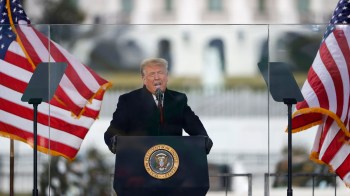Bill puts CEOs on camera in political ads
TEXT OF STORY
Tess Vigeland: Last year the U.S. Supreme Court ruled that corporations and unions are people, too. And as such, they are allowed to spend unlimited amounts of money to bankroll political campaign ads. But this week legislation is expected to be introduced in Congress that would require CEOs to put a name — and a face — to any ads pushing one or the other candidate.
Marketplace’s Nancy Marshall Genzer has more from Washington.
Nancy Marshall Genzer: The new campaign finance legislation would require CEO cameo appearances. It includes a provision known as “Stand by Your Ad.” CEOs would have to show their faces at the end of a political ad, saying their company paid for it.
Joseph Priester teaches marketing at the University of Southern California. He doesn’t think the CEO disclosures would go over too well with consumers. Especially now.
JOSEPH PRIESTER: Now there’s this tension between Wall Street versus Main Street. And sort of my money versus these corporations’ monies. People are going to be particularly sensitive to the perception that Wall Street is sort of influencing their local politics or their national politics.
That’s the point of the legislation. Public shaming might deter corporate-funding for ads.
Democrat Chris Van Hollen of Maryland is co-sponsor in the House. There will be a similar bill in the Senate. Van Hollen says his bill would make CEOs think twice before getting behind a campaign ad.
CHRIS VAN HOLLEN: CEOs are going to have to make these choices about whether or not they want to take their shareholder dollars and spend them to try and influence these campaigns when the voters are going to know who’s funding them.
Of course, corporations could still funnel money to third parties, like trade associations, and have them pay for the ads. They’ve been doing a lot of that lately. The Chamber of Commerce, financed by corporate donations, spent a million dollars on ads for Massachusetts Republican Scott Brown. He eventually won the special election for Ted Kennedy’s Senate seat.
SCOTT BROWN Ad: The Washington politicians continue to fail us. Scott Brown believes in fiscal responsibility.
Under Van Hollen’s bill, the CEO of the Chamber of Commerce would have to appear at the end of ads like this. That would be followed by a list of the ad’s top five funders. The Chamber would have to list the rest of the donors on the Web. Van Hollen says that would prevent corporations from hiding behind third parties.
But Trevor Potter isn’t so sure. He’s a former chairman of the Federal Election Commission who now heads the Campaign Legal Center.
TREVOR POTTER: If you are one of a 100 donors to the Chamber of Commerce, which is going to run ads and the limit of the disclosure is you’re on a list of donors — Is that going to worry corporations, is that going to prevent them from doing it? I don’t know. I doubt it.
But Potter says the top donors who would be listed in commercials might shy away. And Van Hollen’s bill does a couple more things. Companies that got federal money or government contracts wouldn’t be able to buy campaign commercials. And firms that have more than 20 percent foreign ownership wouldn’t be able to spend on campaign ads, either. The constitutionality of those parts of the bill might be challenged.
In Washington, I’m Nancy Marshall Genzer for Marketplace.
There’s a lot happening in the world. Through it all, Marketplace is here for you.
You rely on Marketplace to break down the world’s events and tell you how it affects you in a fact-based, approachable way. We rely on your financial support to keep making that possible.
Your donation today powers the independent journalism that you rely on. For just $5/month, you can help sustain Marketplace so we can keep reporting on the things that matter to you.


















